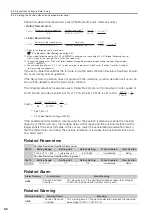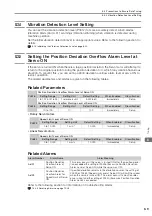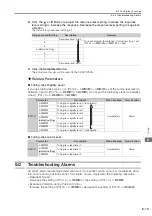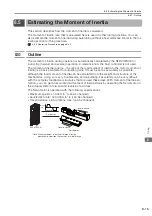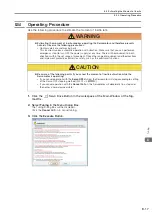
8.1 Overview and Flow of Tuning
8-4
8.1
Overview and Flow of Tuning
Tuning is performed to optimize response by adjusting the servo gains in the SERVOPACK.
The servo gains are set using a combination of parameters, such as parameters for the speed
loop gain, position loop gain, filters, friction compensation, and moment of inertia ratio. These
parameters influence each other, so you must consider the balance between them.
The servo gains are set to stable settings by default. Use the various tuning functions to
increase the response even further for the conditions of your machine.
The basic tuning procedure is shown in the following flowchart. Make suitable adjustments
considering the conditions and operating requirements of your machine.
*
If possible, perform autotuning with a host reference.
If a host controller is not available, set an operation pattern that is as close as possible to the host reference and
perform autotuning without a host reference.
If an operation pattern that is close to the host reference is not possible, perform autotuning with a host reference
while performing program jogging.
End
Start of Tuning
Results acceptable?
Yes
Results acceptable?
Yes
End
No
No
Results acceptable?
No
End
Yes
End
Perform the tuning-less function.
Response acceptable?
Yes
No
Perform custom tuning.
Continuous Vibration
Adjust anti-resonance control.
Residual Vibration When Positioning
Perform vibration suppression.
Perform autotuning with or without a host reference.
*
Estimate the moment of inertia.
Initial Confirmations to Ensure Safe Tuning
8.3 Precautions to Ensure Safe Tuning
Perform manual tuning or the additional adjustment function.



















